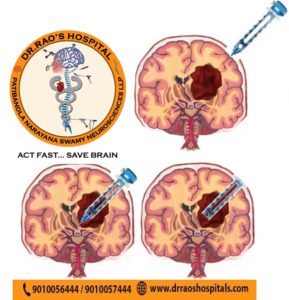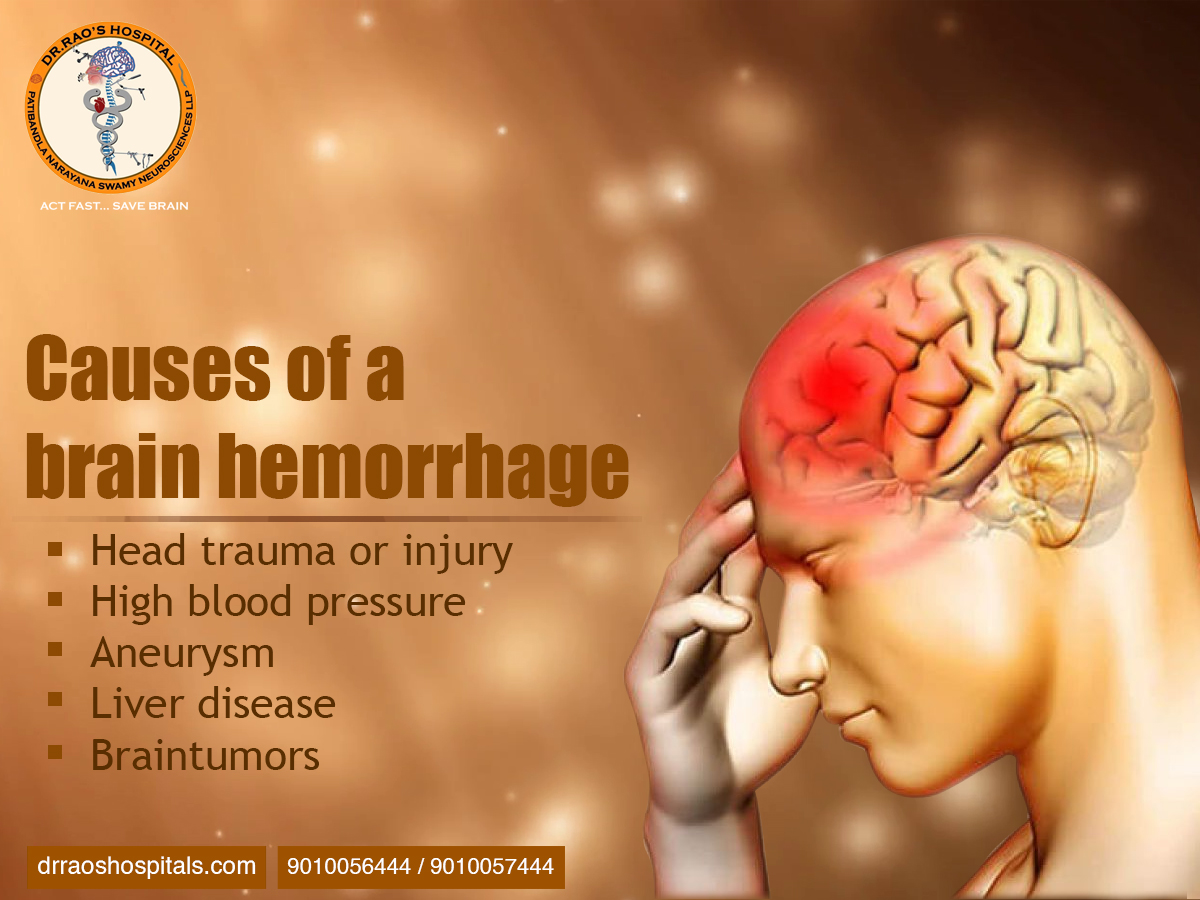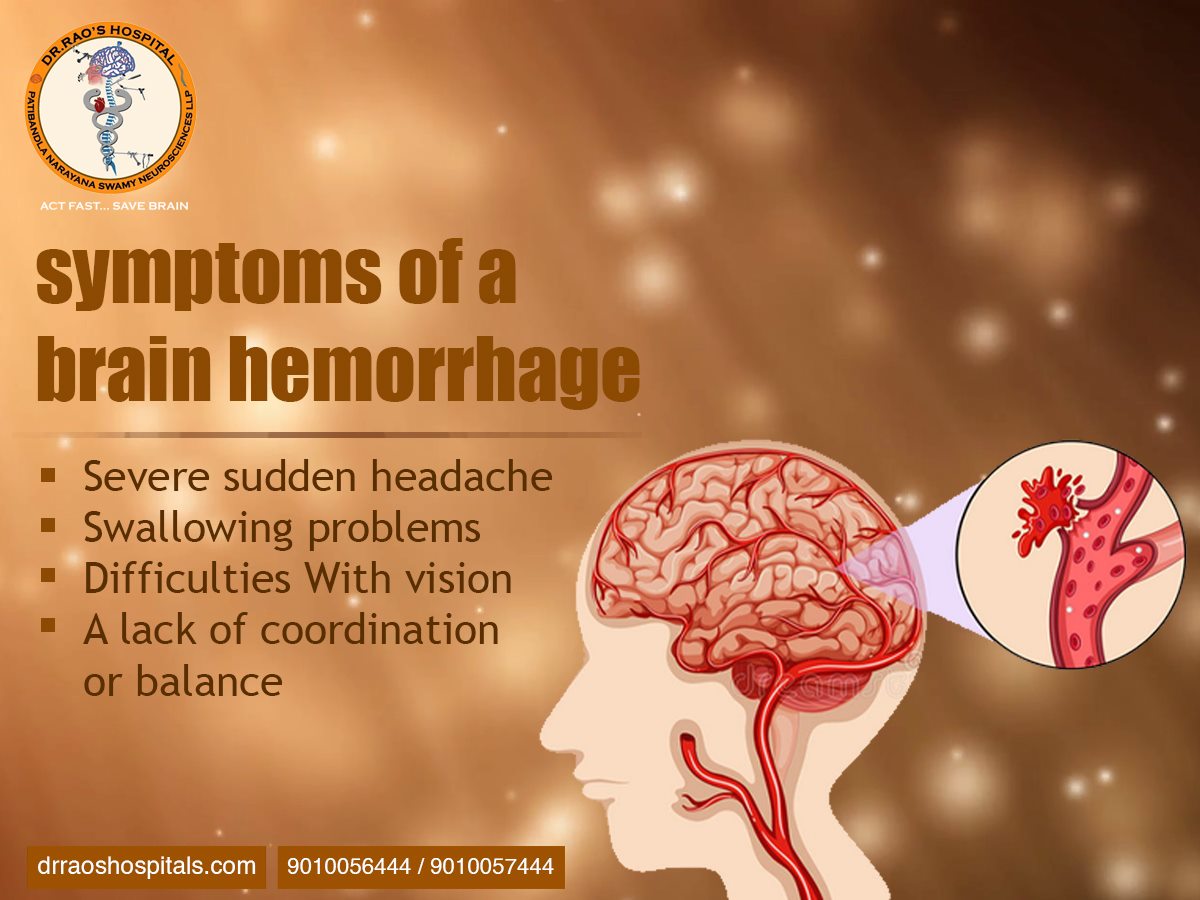Brain Hemorrhage Treatment in Andhra Pradesh
Dr. Rao’s Hospital is one of the best neurology hospital in Guntur. Here you are assured comprehensive brain hemorrhage treatment in Andhra Pradesh.
Brain hemorrhage is a medical emergency, and it is crucial that the patient receives correct treatment immediately.
The 24-hour emergency division of Dr. Rao’s Hospital is well adept at handling all neurosurgery and neurological emergencies, including brain hemorrhage.
Dr. Mohana Rao Patibandla, the founder of this hospital, is a world-acclaimed interventional neuro specialist and Neurosurgeon in Guntur.
He is an expert in endoscopic and microscopic keyhole surgeries, interventional neuroradiology, brain port minimally invasive neuro-oncology, functional neurology, treatment for stroke and cerebrovascular, and many more.

What is brain hemorrhage?
Brain hemorrhage occurs when a cerebral artery bursts, causing localized bleeding in the surrounding tissues.
Cerebral hemorrhages, intracranial hemorrhages, and intracerebral hemorrhages are all terms used to describe brain hemorrhages depending where it occurs in the brain. They account for nearly 13% of all strokes.
Swelling occurs when blood from trauma irritates brain tissues. It is called cerebral edema. A hematoma is a collection of pooled blood that forms a mass. These factors increase pressure on adjacent brain tissue, which lowers critical blood flow and causes brain cells to die.

What are the causes of a brain hemorrhage?
Some of the most common causes and risk factors of brain hemorrhage are:
- Head trauma or injury – Injury is the most common cause of brain hemorrhage, especially in people below 50 years.
- High blood pressure –This chronic illness can cause blood vessel walls to weaken over time. Untreated high blood pressure is a primary cause of brain hemorrhages.
- Aneurysm – It is a condition where the wall of a blood vessel weakens and swells. It can rupture and bleed, resulting in a stroke.
- Anomalies of the blood vessels (Malformations of the arteries and veins) – Blood vessel abnormalities in and around the brain can be present at birth and not detected until symptoms appear.
- Amyloid angiopathy – It is a blood vessel wall abnormality that can emerge due to age or high blood pressure. Before creating a significant bleed, it may create a series of minor, undetectable bleeds.
- Bloodbor bleeding disorder –Both hemophilia and sickle cell anemia can cause a reduction in blood platelets and coagulation. Blood thinners can potentially put you in danger.
- Liver disease –This disorder is linked to an increase in overall bleeding.
- Braintumors
What are the symptoms of a brain hemorrhage?

A brain hemorrhage can cause a variety of symptoms. Sudden tingling, numbness, or paralysis of the face, arm, or leg are some symptoms. However, this will most likely happen on one side of the body.
Brain Hemorrhage symptoms include:
- Severe sudden headache
- Swallowing problems
- Difficulties with vision
- A lack of coordination or balance
- Difficulty in understanding or confusion
- Slurred speech or difficulty in speaking
- Unconsciousness, stupor, or lethargy
- Convulsions
It is necessary to identify these symptoms as soon as possible so that treatment can begin.
How is brain hemorrhage diagnosed?
If a stroke is indicated, it must be evaluated right away. Dr. Rao, an experienced brain hemorrhage doctor in Andhra Pradesh,will do tests to pinpoint the exact location of the brain bleeding.
Options for testing include:
- A CT or MRI scan
- A spinal tap may be required in some cases to confirm evidence of bleeding or rule out other brain issues.
- The doctor may do cerebral angiography where he will inject a dye and then remove X-ray images of the brain. The dye highlights the abnormally formed blood vessels in or near the brain.
Brain hemorrhage treatment in Andhra Pradesh
A severe brain hemorrhage can necessitate surgery. Dr. Rao, one of the best neurosurgeon in Guntur, may use surgical intervention to reduce some of the pressure on the brain.
In case of a burst cerebral aneurysm, the surgeon may perform a craniotomy by removing a portion of the skull and clipping the artery, causing bleeding.
The surgeon may also prescribe anti-anxiety medications, anti-epileptic drugs, and other drugs to control symptoms, including seizures and severe headaches.
Can people recover from a brain hemorrhage?
The extent of the bleeding and the degree of swelling determine how effectively a patient responds to a brain hemorrhage.
Some patients make a full recovery. However, they may need extensive rehabilitation, such as speech, physical and occupational therapy to regain function.
Stroke, loss of brain function, seizures, or drug or treatment side effects are all possible complications. Death is a possibility, and it can happen swiftly even if medical help is given.
Frequently Asked Questions:
Can you have brain hemorrhage due to stress?
When individuals are stressed, their blood pressure can rise. This can cause blood vessels to burst in the brain, resulting in bleeding, a type of stroke known as hemorrhagic stroke.
Stroke on which side of the brain is worse?
The left half of the brain is responsible for thinking, judgment, reasoning, and sequencing. A stroke on the left side can result in various cognitive deficits. All oral functions, including chewing and swallowing, are controlled by the left side of the brain.
Can we recover fully after a hemorrhagic stroke?
After a hemorrhagic stroke, your recovery will be determined by the severity of the stroke, the extent of tissue damage, and how quickly you receive treatment. Those who do survive have a long rehabilitation period, which can span months or even years.
